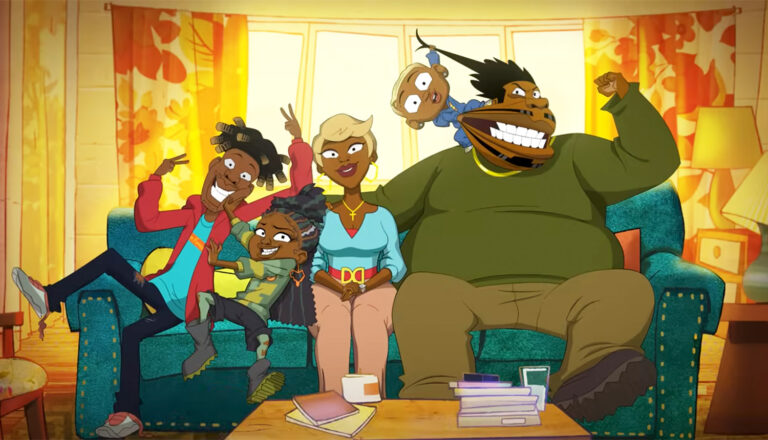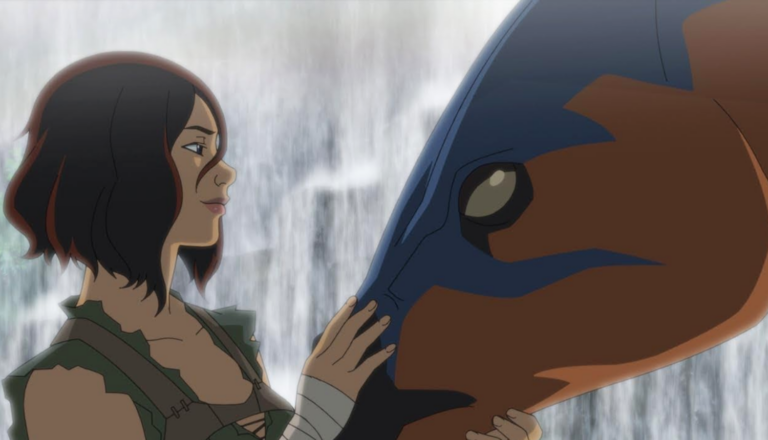
Good Times
Netflix takes a classic sitcom, Good Times, and turns it into a vulgar, violent, sexually-charged TV-MA show.

Many people have a love-hate relationship with their jobs. Doctors might love to patch people up but hate the paperwork. Accountants might love numbers but can’t stand people. I like to write, but I despise it when my editor says, “Write a review, you idiot! We have no need of epic poetry penned in Old English!” Thus, this review.
But Eve Polastri may take her own love-hate relationship with her work a bit too far.
Eve is a talented investigator for MI5—essentially Britain’s version of the FBI. And for quite some time, she was on the trail of a nefarious and, quite frankly, psychopathic assassin called Villanelle. Eve’s pretty good at her job, too, though it doesn’t hurt that Villanelle leaves behind corpses like Hansel and Gretel left breadcrumbs. (Doesn’t hurt Eve’s investigations, I mean. Obviously, it’s rather painful for the victims.)
But Eve’s dedication to her assignment goes beyond pure professional enthusiasm. Eve knows that Villanelle’s a ruthless killer. But truth be told, Eve kinda digs her, too.
The feeling’s mutual, by the way: The two have crossed paths plenty, and if at least part of Eve wants Villanelle to spend her life behind bars, the killer wants to spend a life with Eve. After Eve rejects Villanelle’s advances, Villanelle adopts the nickname “Nelle,” joins a church and invites Eve to her baptism (which Eve declines). You can drop the “Villa,” but it doesn’t make you less of a villain.
Obviously, Villanelle and Eve’s relationship is … complex. A few other salient facts further compound said complexity. One is The Twelve, the shadowy organization who originally recruited and trained Villanelle and whom Eve is now trying to track down. Two, Eve’s former boss, Carolyn, always seems to have her own mysterious agenda.
Given the whole love-hate theme going on in Killing Eve, perhaps it’s not surprising that we felt a bit the same way about the show itself.
This BBC America program is clever, well-written and skillfully realized, anchored by the performances of Jodie Comer (Villanelle) and the Golden Globe-winning Sandra Oh in the title role. According to the review-aggregator site Metacritic, Killing Eve was the highest-praised show of 2018.
But—and you knew this was coming, didn’t you?—it’s still a show about the unrequited same-sex, love-hate obsession between a seriously disturbed killer and the morally compromised detective pursuing her. Not exactly the sort of show that Plugged In could, or would, shower praises upon.
Killing Eve doesn’t need to shock viewers with salacious visuals to hold their attention, but we still see plenty of blood and, it would seem, at least one terrible murder every week. Villanelle and Eve are rarely in the same place long enough to canoodle, but when they are, you can bet on some sexual tension and content. And just as blood can splatter over the occasional crime scene, so can some seriously bad language.
In an effort to prove that she’s no longer a bloodthirsty killer, Villanelle joins a church and requests to be baptized. Eve doesn’t quite buy it, but even if she did, she can’t be distracted. She’s on a mission to hunt down The Twelve.
Villanelle’s priest hesitates to baptize her since he thinks she’s more interested in the appearance of baptism than the actual act. When she serves fish and loaves for dinner, he tells her she doesn’t have to live exactly as they did the Bible, suggesting that her actions are all for show. There are moments where Villanelle really seems to want salvation. However, the priest’s fears are warranted since after Villanelle is baptized (during which, she repeatedly interrupts the priest), she speaks to an effigy of Christ, stating that if He existed, He would show her a sign, so He must not exist. And this becomes even more blasphemous when she later hallucinates Christ as herself in drag. (Even more problematic: She attempts to drown a woman in the baptismal pool.) The priest and his daughter named their mean cat “Lucifer” as a joke. A funeral home advertises multi-faith services.
A woman writes a sexually explicit story about two women. Eve asks a man if he wants to have sex and they both unbuckle their pants. Later we see the shirtless man in bed. They joke about sex throughout. Two couples kiss (including a same-sex couple).
A man is shot in the hand. We hear about the murders of several people, and we see a picture of a man shot in the head. When a cat scratches Villanelle, she responds instinctively, killing the animal (and we see its bleeding body in a bathtub). Later, when someone finds the buried animal, she lies and says she found it on the side of the road and buried it to spare them the pain of losing a pet. She then nearly drowns a woman (the woman loses consciousness) before changing her mind and saving the woman with CPR. We hear a man’s daughter died suddenly. A woman pulls back the eyelids of a cadaver in curiosity. Several people get beaten up. Two people wrestle for practice. Eve slaps a woman.
People drink wine. A woman says she won’t be sober for boring events. We hear about a cat vomiting. A woman spits. We hear misuses of God’s name, as well as “a–,” “d–n,” “p-ss” and the s-word.
After stabbing Villanelle, Eve leaves Paris and makes her way back home to London. But she’s worried that her deed (which she believes might’ve been a murder) could be uncovered, as well as being confused by her conflicted feelings toward her victim. So Eve struggles to present a façade of normalcy for her husband. Meanwhile, Villanelle survives the wound, makes her way to a hospital and plots to pursue her enemy/lover.
Villanelle does so with the aid of her hospital roomie, a teen who was injured in a terrible car crash that killed both of his parents. He’s having extensive skin grafts done to his face, and he invites Villanelle to look under the bandages. Villanelle does so and tells him his face looks like “pizza.” (Indeed, it does look pretty grotesque). The teen bemoans his fate, and Villanelle puts her arm around him to comfort him—right before breaking his neck. (She perhaps thinks it’s an act of mercy.)
Before making it to the hospital, Villanelle staggers around the streets of Paris with bloody hands. She pours vodka into an open wound. (She takes a drink from the bottle, too.) Villanelle jumps in front of a taxi so that it’ll hit her, thus forcing the driver to take her to a hospital. The driver, apparently Muslim, pleads to God for help and protection. She steals loads of drugs from the hospital, pilfers other things, too, and lies repeatedly to the people around her to further her own ends.
A woman recalls how her father, a spy, used to hang out in a popular gay hotspot, both to have clandestine meetings and “to have sex with boys, of course, which would’ve been an added bonus for Daddy,” she says. The woman seems quite affectionate with a female coroner, touching her familiarly on the cheek. A woman takes a bath, holding her knees close to her chest. (Nothing critical is seen.)
A two-month-old corpse is examined. When one of the investigators says that she’s suddenly hungry for a hamburger, the coroner explains that the scent of formaldehyde “makes you crave meat.” An innocent woman is shot. A family of four may be killed (though by episode’s end, it’s unclear.) Eve and her husband drink wine, and Eve sits by a glass of whiskey (that she has presumably ordered). A woman, seeing Eve’s nervous agitation, assumes she’s a recovering drug addict. We hear references to messy stomach ailments.
Characters use the s-word three times (and once in French, too), along with “d–n,” “d–k” and “p-ss.” God’s name is misused twice.


Paul Asay has been part of the Plugged In staff since 2007, watching and reviewing roughly 15 quintillion movies and television shows. He’s written for a number of other publications, too, including Time, The Washington Post and Christianity Today. The author of several books, Paul loves to find spirituality in unexpected places, including popular entertainment, and he loves all things superhero. His vices include James Bond films, Mountain Dew and terrible B-grade movies. He’s married, has two children and a neurotic dog, runs marathons on occasion and hopes to someday own his own tuxedo. Feel free to follow him on Twitter @AsayPaul.

Emily studied film and writing when she was in college. And when she isn’t being way too competitive while playing board games, she enjoys food, sleep, and geeking out with her husband indulging in their “nerdoms,” which is the collective fan cultures of everything they love, such as Star Wars, Star Trek, Stargate and Lord of the Rings.

Netflix takes a classic sitcom, Good Times, and turns it into a vulgar, violent, sexually-charged TV-MA show.

While its protagonist might live a nuanced life, The Sympathizer’s problematic content can’t be described the same way.

Say hola once again to the iconic explorer in this faithful reboot of the children’s series.

Based on a popular video game, Ark: The Animated Series features hungry dinosaurs, bloodthirsty people and plenty of problems.